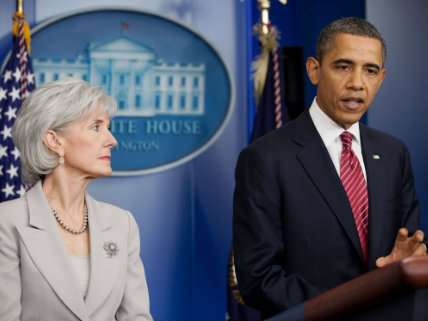The Obama Administration's Response to Insurance Plan Cancellations Is Misleading and Condescending

The Obama administration's response to a spate of recent stories reporting that individuals would lose access to their current health plans as a result of Obamacare—despite explicit presidential promises that this would never happen—has been a combination of misdirection and bullshit.
The latter can be found in blame-shifting retorts like this one, from senior presidential adviser Valerie Jarrett, who tweeted the following on Monday evening: "FACT: Nothing in #Obamacare forces people out of their health plans. No change is required unless insurance companies change existing plans."
The important notion here is that if anything happens that people don't like, it's not the administration's fault. But the administration clearly played the key role in the insurance market changes that led to plans being canceled. No, the health law doesn't force insurers to cancel plans in progress, but it does institute a slew of new requirements that were certain to result in health insurers dropping current plans for millions of people as the yearly contracts for those plans come up for renewal.
This fact that Obamacare makes it impossible for insurers to keep selling many of today's health plans simply isn't up for debate. Even the White House admits as much. As Press Secretary Jay Carney said earlier this week, "It's true that there are existing health care plans on the individual market that don't meet those minimum standards and therefore do not qualify for the Affordable Care Act." Those plans will be regulated out of existence by Obamacare.
And there's no question that the administration knew this would be the effect all along. Republicans warned over and over that people would lose their existing health plans under the law. And as NBC News reported earlier this week, regulations issued by the administration back in 2010 estimated that, as written, the new rules would interact with the existing insurance market in such a way that between 40 and 67 percent of the individual market policies on the market would lose their safe, grandfathered status under the law.
Indeed, the administration chose to write these rules strictly and narrowly, making grandfathered status not particularly easy to retain. That ensured that relatively few plans would be protected—and that plans held by millions of people would be affected. The administration knew from the beginning what the result would be, and issued the rules anyway, which is to say that they weren't just aware of these effects, they intended them.
Yet in speech after speech, President Obama repeated the statement that "if you like your health plan, you will be able to keep your health plan"—sometimes even strengthening the end of the line to: "You'll be able to keep your health plan, period."
Period.
Which brings us to the misdirection. President Obama's insistence that people would be able to keep their current plans if they wanted to didn't come with any disclaimers or caveats. Yet one of the emerging lines from the administration and its allies is that, yes, it's true that some individual market plans will no longer qualify under the law's coverage standards. But the insurance plans being dropped are so flimsy as to practically not count as insurance at all. And thanks to Obamacare, people in today's individual market can now shop for better plans through the law's exchanges, where they'll be eligible for subsidies to defray any cost concerns.
The argument here, essentially, is that anyone whose plan gets canceled didn't really like his or her plan—that, even though the beneficiary might not know it, the plan being canceled wasn't worth having anyway.
It's a fundamentally condescending argument that makes a blanket assumption that people don't know whether or not they liked their plan. It's also a bunch of nonsense.
The administration can't possibly know what sort of insurance each and every individual likes or wants, and it can't account for the people who are losing plans that clearly did meet the needs of the individuals who purchased them.
Take the example of Robert Laszewski, an influential and widely quoted health insurance industry consultant. His individual market plan was recently canceled because, according to his insurer, it's not good enough under Obamacare. Does he really not know enough about the way insurance works to be able to say that he had good coverage, and liked what he had? He liked his plan. He had good coverage. He's not able to keep it. Period.
Yes, he can still get health insurance. But his new options are significantly more expensive. The administration might respond that the law provides subsidies to mitigate the effects of increased prices. (That's what Health and Human Services Secretary Kathleen Sebelius did in testimony this morning when presented with one story of canceled coverage.) But not everyone, and perhaps not even most people, whose existing plans disappear, will have access to those subsidies. In California, for example, about 900,000 residents will probably see their existing individual market plans canceled. But according to a spokesperson for the state's insurance exchange, only about a third of those people will have access to subsidies.
What President Obama told the public over and over again wasn't true. But now that people are finding out that it isn't true, the administration's response is to shift the blame to third parties, and to imply that the millions of people who are losing plans they like are too stupid to know what's actually good for them. In short: If you like your plan, and lose it, it's not our fault. And besides, you didn't really like it anyway.


Show Comments (180)